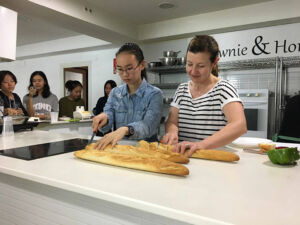
As a GYA-Accredited Gap Year Consultant, I work closely with students to design meaningful plans for their year out. Whether a consultant is involved or not, parents play a pivotal role in their child’s gap year. They can help set reasonable boundaries, provide encouragement, and offer support during this transformative rite of passage.
I always remind parents that a gap year is also a milestone in their lives – watching your child fledge is full of its own set of emotions. In many ways, gap year parents are asked to leave their own comfort zone in order to allow their child to enter adulthood on their own terms.
If you are currently helping your child through their gap year, you are not alone! I’ve compiled some sage advice from those who have ushered their child through a gap year. Read on, and know you will be on a well-trodden path of supportive caregivers who have come before you!
1. REFRAME YOUR OWN ASSUMPTIONS
“I was completely against the gap year,” explains gap year parent Stephanie, whose daughter decided to take a gap year in 2020 due to covid restrictions forcing most colleges to start classes online.
Even with the gap year growing in acceptance and popularity, some parents still struggle with preconceived notions about what it can mean for their son or daughter. They may worry a gap year will leave them behind academically or that they may never go to college if they take time out from their formal studies. Both research and anecdotal data tell us that the overwhelming majority of students not only start college on time after their gap year, but tend to outperform traditional students academically when they do.
Stephanie admitted a drastic change of heart. “Now having completed it, I can absolutely say that this year was the best decision for her. [My daughter’s] college experience will be that much more rewarding BECAUSE of this gap year, not in spite of it.”
2. START THINKING ABOUT A GAP YEAR EARLY
In my experience, the sooner a student starts brainstorming their gap year plans, the more deliberate the ultimate itinerary turns out to be. Gap year parent Jane suggests, ”Try to get started on the exploration of opportunities early in the process and be open-minded. A variety of experiences is valuable…these kids are still young – why not take advantage of a few opportunities?”
An excellent entry point to research is visiting a USA Gap Year Fair, browsing the list of GYA accredited opportunities online and downloading the recently updated Ultimate Gap Year Planning Guide.
3. GOOD COMMUNICATION IS ESSENTIAL
Start planning by getting everyone on the same page.
“Work to agree on an outline together about the wants of the child vs/plus requirements of parents. Find out where we can all agree,” says parent Ashley.
“It’s all about balance,” agrees Diann, whose son planned a Spanish-immersion gap year that took him to Spain and South America. She encourages families to set expectations together regarding accountability and decision-making. It helps for parents to set parameters at the outset of planning and then allow their child the freedom to tackle the decision-making within a framework that’s comfortable for everyone.
Gap Year parent Debra offers this advice: “Take both your child’s and your wants and desires into consideration. As parents, we were not comfortable with some programs, but our advisor was able to find programs that made everyone happy. There are so many programs out there, you can find something that works for every member of the family.”
“It’s all about balance,” explains Diann, whose son planned a Spanish-immersion gap year that took him to Spain and South America. She encourages families to set expectations together regarding accountability and decision-making. It helps for parents to set parameters at the outset of planning and then allow their child the freedom to tackle the decision-making within a framework that’s comfortable for everyone.
In my experience, the sooner a student starts brainstorming their gap year plans, the more deliberate the ultimate itinerary turns out to be. Gap year parent Jane suggests, “Try to get started on the exploration of opportunities early in the process and be open-minded. A variety of experiences is valuable…these kids are still young – why not take advantage of a few opportunities?”
An excellent entry point to research is visiting a USA Gap Year Fair, browsing the list of GYA Accredited Gap Year Program Providers online and downloading the recently updated Ultimate Gap Year Planning Guide.
4. Research is Key
Planning a gap year is a research undertaking for the student and their family. After her daughter’s gap year, Jessica offers, “I think you have to figure out what your goals are and then hang in there until you find the right programs. There are so many choices. It can be overwhelming, but with help you can narrow in on the right ones. I also think it was extremely helpful to speak with the program directors. In one case we decided not to pursue a program that had looked like a good fit from their materials.”
Ann, another gap year parent, adds, “Use a consultant and the Gap Year Association to plan so you can feel confident about programs and how they manage risk and safety. Don’t be afraid to leave the traditional path….it is more than worth it!”
5. Ensure Your Child Has Skin in the Game
“Travel AND work,” says Hilary, who watched her son save money to travel to Asia and Belize. “Make sure the student earns something to help pay for at least some of the experience.” Students can save for their gap time in a variety of ways, including crowd-funding, working or leveraging a special skill. Wendy’s daughter knitted scarves for three months to fund a trip to Thailand. She believes the experience was fantastic for her daughter, including the fact that she earned the experience. “The three months in Thailand was a life changer for my daughter,” Wendy says. “It showed her that she was strong and resilient, that the world is full of kind people… She met lots of people from many different countries and made some lasting friendships.”
6. Help Your Child Mentally and Physically Prepare for Their Travels
Preparing for a Gap Year is a delicate balance of preparation and learning to roll with the inevitable bumps in the road. Perrin’s son spent much of his Gap Year traveling independently in Argentina. She thinks it’s important for fellow parents to realize, “Nothing is ever going to be exactly what you anticipate – but it will all be a great experience.”
Other parents urge successors to, “Apply for a South African visa asap,” or “Don’t forget the vaccinations!” In other words, create a check-list of the things that need to happen in the months leading up to departure. The physical tasks of preparing for a trip have the added benefit of mentally preparing a student for leaving.
7. Step Back and Let the Magic Happen
It’s hard to watch your child struggle on their Gap Year, but allowing your child to problem solve is all part of the experience. Gap Year parent Betsy explains, “Let your child get into and out of her/his own trouble. [Gaining] confidence that they can survive travel misfortunes is part of the beauty of a gap year.”
Genevieve feels the same way: “Parents need to let their kids go…I didn’t hear from my son during the time he was living in his Fijian village, but I thought it was important to let him have the space and make his own way.”
8. Witness the Evolution
We love hearing from parents about the changes they witness in their own children over the course of a gap year. Here are some highlights from recent parents of gap year students:
- “My son is much happier and more confident now. He sees his family in a new light, appreciating his time with us in a different way. I think this brought more color and light to his life. He was exposed to art, culture, food, nature and people that opened up how he sees the world.”
- “This experience was life changing for [my daughter]. She left as a recent high school graduate who waited to be told what to do and returned as a young woman who is confident in her abilities like never before. It helped her find her passion for teaching, for travel and for meeting people of all walks of life.”
- “My son has grown into a confident, knowledgeable, independent thinker who sees the world as bigger than himself.”
- “Navigating these new experiences on his own developed more grit, confidence, self reliance [my son] needed. Being in nature and helping others enhanced his mental wellbeing and sense of connection.”
- “She was already very well traveled and independent. But this experience showed her that she CAN take care of herself independently and that even language and cultural barriers can allow for a wonderful experience. As a result, there is nowhere she won’t go and nothing she is reluctant to try – she is very confident that she can be happy anywhere. This totally removed any fear of the unknown – the world is now truly opened to her, whatever opportunities she might have.”
9. Parting Words
Perhaps Gap Year parent Ann says it best: “You will never regret giving your child this opportunity.”
ABOUT THE AUTHOR
 Julia Rogers founded EnRoute Consulting in 2008, inspired by the idea that more young Americans should engage in service work and travel as a way of learning about themselves and the world around them. Now, over a decade later, she is a GYA Accredited Gap Year Consultant who has guided hundreds of students and their parents through the gap year planning process.
Julia Rogers founded EnRoute Consulting in 2008, inspired by the idea that more young Americans should engage in service work and travel as a way of learning about themselves and the world around them. Now, over a decade later, she is a GYA Accredited Gap Year Consultant who has guided hundreds of students and their parents through the gap year planning process.
Julia Rogers, GYA Accredited Consultant & Board President Emeritus, specializes in helping students plan their gap years from start to finish.
Categories
- Advising (7)
- Alumni (2)
- Career (4)
- College & University (15)
- Communication (17)
- DEIA (4)
- Fair Trade Learning (3)
- Finances (12)
- Gap Year Benefits (67)
- Growth & Development (6)
- Leadership (5)
- Learning & Reflection (54)
- Mental Health (4)
- Planning (59)
- Professional Development (4)
- Research (4)
- Risk Management (3)
- Safety (5)
- Service-Learning (10)
- Standards & Accreditation (1)
- Sustainability (6)
- Voices Project (20)
